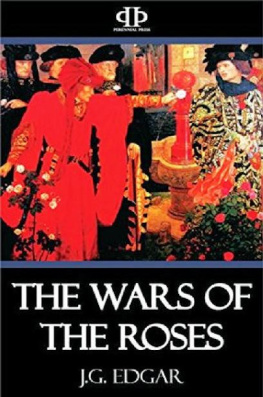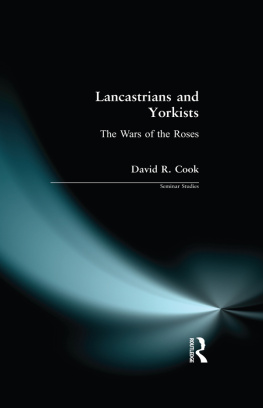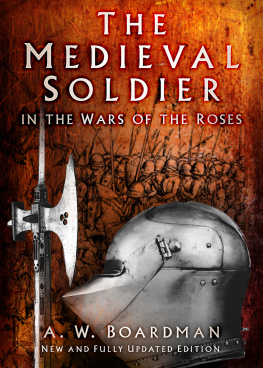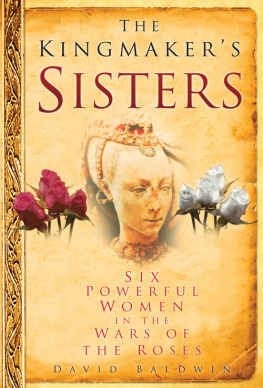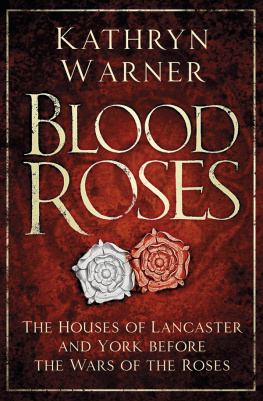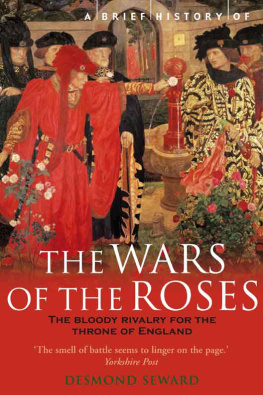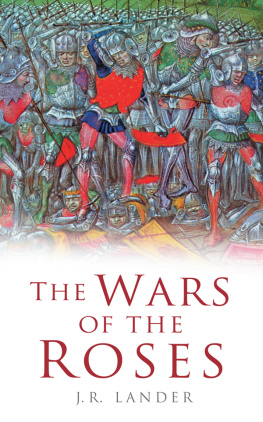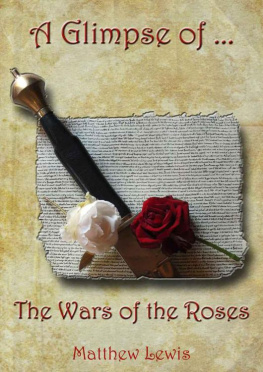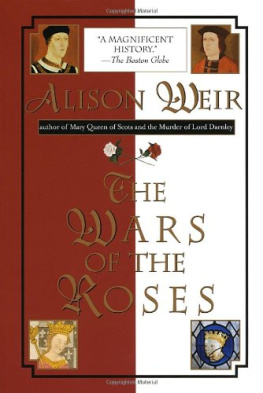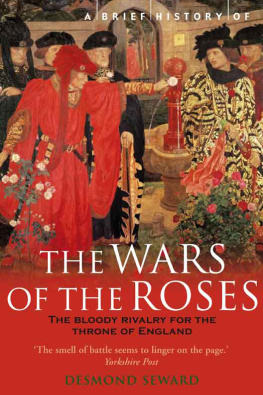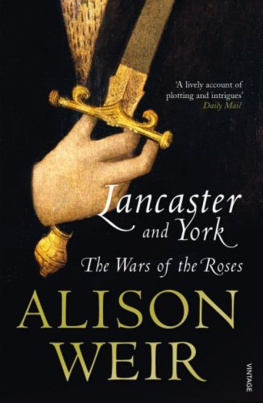john G. Edgar - The Wars of the Roses
Here you can read online john G. Edgar - The Wars of the Roses full text of the book (entire story) in english for free. Download pdf and epub, get meaning, cover and reviews about this ebook. year: 2015, genre: Non-fiction. Description of the work, (preface) as well as reviews are available. Best literature library LitArk.com created for fans of good reading and offers a wide selection of genres:
Romance novel
Science fiction
Adventure
Detective
Science
History
Home and family
Prose
Art
Politics
Computer
Non-fiction
Religion
Business
Children
Humor
Choose a favorite category and find really read worthwhile books. Enjoy immersion in the world of imagination, feel the emotions of the characters or learn something new for yourself, make an fascinating discovery.
- Book:The Wars of the Roses
- Author:
- Genre:
- Year:2015
- Rating:4 / 5
- Favourites:Add to favourites
- Your mark:
- 80
- 1
- 2
- 3
- 4
- 5
The Wars of the Roses: summary, description and annotation
We offer to read an annotation, description, summary or preface (depends on what the author of the book "The Wars of the Roses" wrote himself). If you haven't found the necessary information about the book — write in the comments, we will try to find it.
The Wars of the Roses — read online for free the complete book (whole text) full work
Below is the text of the book, divided by pages. System saving the place of the last page read, allows you to conveniently read the book "The Wars of the Roses" online for free, without having to search again every time where you left off. Put a bookmark, and you can go to the page where you finished reading at any time.
Font size:
Interval:
Bookmark:

by Simplicissimus Book Farm
Itis generally admitted that no period in England's history is richerin romantic incident than the three decades occupied by the Wars ofthe Roses; but the contest is frequently described as having beenwithout interest in a political point of view. This idea seemserroneous. That struggle of thirty years was no mere strife ofchiefs, ambitious of supremacy and unscrupulous as to means. Indeed,the circumstances of the country were such that no hand would havebeen lifted against sovereignswhether reigning by Parliamentary orhereditary rightwho showed a due respect to ancient rights andliberties. But the tyranny exercised, first by the ministers of thesixth Henry, and afterward by those of the fourth Edwardoneinfluenced by Margaret of Anjou, the other by the Duchess of Bedford,both "foreign women"was such as could not be borne byEnglishmen without a struggle; and evidence exists that RichardNeville, in arming the people against these kings, did so to preventthe establishment of that despotism which John Hampden and OliverCromwell afterward fought to destroy.
Withsuch impressions as to the origin of the war which, during thefifteenth century, agitated England and perplexed Continental rulers,I have, in the following pages, traced the course of events from theplucking of the roses in the Temple Gardens to the destruction ofRichard the Third, and the coronation of Henry Tudor, on BosworthField. And I venture to hope that a book written to attract Englishboys of this generation to a remarkable epoch in the medivalhistory of their country will be received with favor, and read withinterest, by those for whose perusal it is more particularlyintended.
J.G. E.
Aboutthe middle of the ninth century a warrior named Tertullus, havingrendered signal services to the King of France, married Petronella,the king's cousin, and had a son who flourished as Count of Anjou.The descendants of Tertullus and Petronella rose rapidly, andexercised much influence on French affairs. At length, in the twelfthcentury, Geoffrey, Count of Anjou, surnamed Plantagenet, from wearinga sprig of flowering broom instead of a feather, espoused Maude,daughter of Henry Beauclerc, King of England; and Henry Plantagenet,their son, succeeded, on the death of Stephen, to the English throne.
Havingmarried Eleanor, heiress of Aquitaine, and extended his continentalempire from the Channel to the Pyrenees, Henry ranked as the mostpotent of European princes. But, though enabled to render greatservices to England, he was not an Englishman; and, indeed, it wasnot till the death of John, at Swinehead, that the English had a kingwho could be regarded as one of themselves. That king was Henry theThird, born and educated in England, and sympathizing with thetraditions of the people over whom he reigned.
Unfortunatelyfor Henry, he was surrounded by Continental kinsmen, whose conductcaused such discontent that clergy, barons, citizens, and peopleraised the cry of England for the English; and Simon de Montfort,though foreign himself, undertook to head a movement againstforeigners. A barons' war was the consequence. Henry, defeated atLewes, became a prisoner in the hands of the oligarchy; and there wassome prospect of the crown passing from the house of Plantagenet tothat of Montfort.
Atthis crisis, however, Edward, eldest son of the king, escaped fromcaptivity, destroyed the oligarchy in the battle of Evesham, andentered upon his great and glorious career. Space would fail us toexpatiate on the services which, when elevated to the throne asEdward the First, that mighty prince rendered to England. Suffice itto say that he gave peace, prosperity, and freedom to the people,formed hostile races into one great nation, and rendered his memoryimmortal by the laws which he instituted. [1]
Forthe country which the first Edward rendered prosperous and free, thethird Edward and his heroic son won glory in those wars which madeEnglishmen, for a time, masters of France. Unhappily, the BlackPrince died before his father; and his only son, who succeeded when aboy as Richard the Second, departed from right principles ofgovernment. This excited serious discontent, and led the Englishpeople to that violation of "the lineal succession of theirmonarchs" which caused the Wars of the Roses.
Besidesthe Black Prince, the conqueror of Cressy had by his queen,Philippathe patroness of Froissartseveral sons, among whom wereLionel, Duke of Clarence; John of Gaunt, Duke of Lancaster; andEdmund of Langley, Duke of York. [2] Lionel died early; but John of Gaunt survived his father and eldestbrother, and was suspected of having an eye to the crown which hisyoung nephew wore. No usurpation, however, was attempted. But whenJohn was in the grave, his son, Henry of Bolingbroke, returning froman irksome exile, deposed Richard, and sent him prisoner toPontefract Castle, where he is understood to have been murdered.
Onthe death of Richard, who was childless, Henry the Fourth, as son ofJohn of Gaunt, would have had hereditary right on his side, but thatLionel of Clarence had left a daughter, Philippa, wife of Mortimer,Earl of March, and ancestress of three successive earls. Of these,Edmund, the last earl, was a boy when Henry of Bolingbroke usurpedthe throne; and his sister, Anne Mortimer, was wife of RichardPlantagenet, Earl of Cambridge, second son of Edmund of Langley, Dukeof York. "This was that princely branch," says Sandford,"by the ingrafting of which into the stock of York, that treebrought forth not only White Roses, but crowns and sceptres also."
Henrythe Fourth regarded young March with jealousy, and had him vigilantlyguarded. But Henry the Fifth completely won the earl's loyalty, andmade him a most zealous adherent. March showed no ambition to reign;and the nation, intoxicated with Agincourt and glory and conquest,cared not an iota for his claims. At the time when the hero-kingexpired at Vincennes and the Earl of March died in England thedynastic dispute was scarcely remembered, and it would never, in allprobability, have been revived had the Lancastrian government notbecome such as could not be submitted to without degradation. It waswhen law and decency were defied, and when Englishmen were in dangerof being enslaved by a "foreign woman," that theyremembered the true heir of the Plantagenets and took up arms tovindicate his claims.
OnSt. Nicholas's Day, in the year 1421, there was joy in the castle ofWindsor and rejoicing in the city of London. On that day Katherine deValois, youthful spouse of the fifth Henry, became mother of a princedestined to wear the crown of the Plantagenets; and courtiers viedwith citizens in expressing gratification that a son had been born tothe conqueror of Agincourtan heir to the kingdoms of England andFrance.
Henryof Windsor, whose birth was hailed with a degree of enthusiasm whichno similar event had excited in England, was doomed to misfortunefrom his cradle. He was not quite nine months old when Henry theFifth departed this life at Vincennes; and he was still an infantwhen Katherine de Valois forgot her hero-husband and all dignity forthe sake of a Welsh soldier with a handsome person and an imaginarypedigree. The young king, however, was the beloved of a thousandhearts. As son of a hero who had won imperishable glory for England,the heir of Lancaster was regarded by Englishmen with sincereaffection; the legitimacy of his title even was unquestioned; and thegenius of his uncles, John, Duke of Bedford, and Humphrey, Duke ofGloucester, under whose auspices the royal boy was crowned in Londonand Paris, created a feeling of security seldom felt by kingdoms atthe beginning of long minorities.
Font size:
Interval:
Bookmark:
Similar books «The Wars of the Roses»
Look at similar books to The Wars of the Roses. We have selected literature similar in name and meaning in the hope of providing readers with more options to find new, interesting, not yet read works.
Discussion, reviews of the book The Wars of the Roses and just readers' own opinions. Leave your comments, write what you think about the work, its meaning or the main characters. Specify what exactly you liked and what you didn't like, and why you think so.

